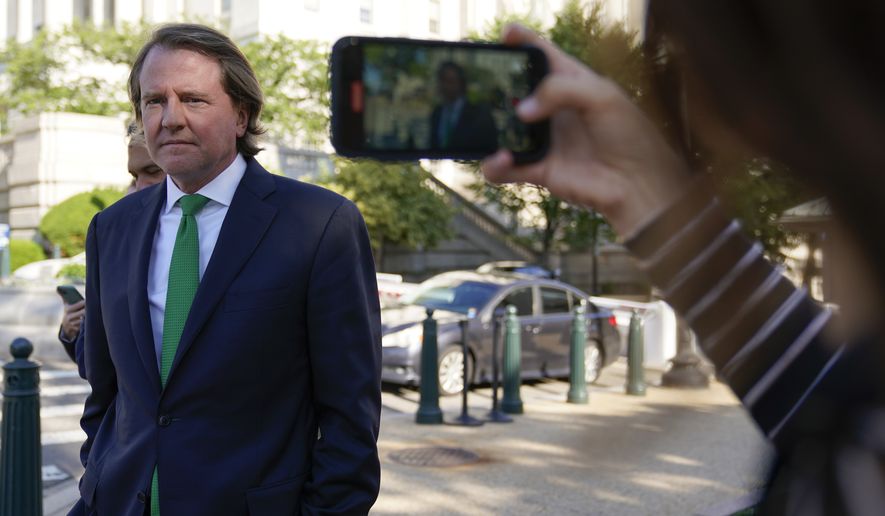Ex-White House Counsel Don McGahn’s testimony fizzled for Democrats looking for new evidence that President Trump tried to obstruct special counsel Robert Mueller’s probe, according to a transcript released Wednesday.
Mr. McGahn reaffirmed what had already been publicly disclosed in Mr. Mueller’s final report, but offered no new insight.
During his closed-door deposition on Friday, Mr. McGahn repeated his refusal to fire the special counsel, despite considerable pressure from the then-president.
Mr. McGahn retold how he refused to follow Mr. Trump’s orders, choosing to resign than trigger a potential Saturday Night Massacre, referring to a similar Watergate-era scandal for the Nixon administration.
He also detailed how Mr. Trump told him to deny he tried to fire Mr. Mueller.
Mr. Trump has repeatedly denied the accusations.
Mr. McGahn said if he had released that statement in 2018, he could have been indicted for lying to the special counsel, a federal crime.
“Given his track record of prosecuting people for [false statements], I would have probably been next,” Mr. McGahn testified. “He had already publicly made clear he was going after various people for that and that certainly would weigh on anybody’s mind.”
As Mr. McGahn tells it, Mr. Trump asked him to tell then-Deputy Attorney General Rod Rosenstein that Mr. Mueller was “too conflicted” to serve as special counsel.
Although the former White House lawyer acknowledged that Mr. Trump did not specifically tell him to remove Mr. Mueller, it was clear what he meant.
That means Mr. Trump lied when he told the press that he never suggested firing Mr. Mueller, Mr. McGahn said.
“He certainly entertained the idea,” Mr. McGahn said. “Certainly seemed to ask a number of people about it. Certainly had a number of conversations with me about something along those lines.”
“So, you know, it was disappointing that he’d come out and say ‘it was never on the table,’ when certainly, at least the conflict-of-interest issue and whether it would preclude Mueller from being special counsel, certainly was discussed,” he continued.
Had Mr. Rosenstein axed Mr. Mueller, the country would have reached a “point of no return,” Mr. McGahn told lawmakers.
“What I was not going to do is cause any sort of chain reaction that would cause this to spiral out of control in a way that wasn’t in the best interests … of my client, which was the president,” he said.
But he also detailed how Mr. Trump “fully cooperated” with the Mueller investigation and demanded others do the same.
“As I said before and the [Mueller] report reflects, the president instructed cooperation,” he said.
He also said he did not witness any collusion between Mr. Trump or members of his 2016 campaign and Russia.
“Whatever ‘collusion’ means, I don’t think I witnessed anything,” he said.
Lawmakers on both sides of the aisle claimed victory with Mr. McGahn’s testimony despite the lack of new information.
“The interview uncovered no nefarious plot to stifle ongoing investigations in relation to the Mueller probe or other related inquiries into the Trump administration,” said Rep Jim Jordan of Ohio, the ranking Republican on the committee.
“If there is any clear conclusion from the interview, it is that the Democrats over-promised when it came to McGahn’s testimony and failed again to find any wrongdoing on the part of President Trump,” he continued.
House Judiciary Committee Chairman Jerrold Nadler, New York Democrat, saw it differently. He said Mr. McGahn’s testimony gave a firsthand view of how “dangerously close” Mr. Trump came to firing the special counsel.
“Mr. McGahn provided the committee with substantial new information — including firsthand accounts of President Trump’s increasingly out-of-control behavior, and insight into concerns that the former president’s conduct could expose both Trump and McGahn to criminal liability,” he said.
• Jeff Mordock can be reached at jmordock@washingtontimes.com.




Please read our comment policy before commenting.